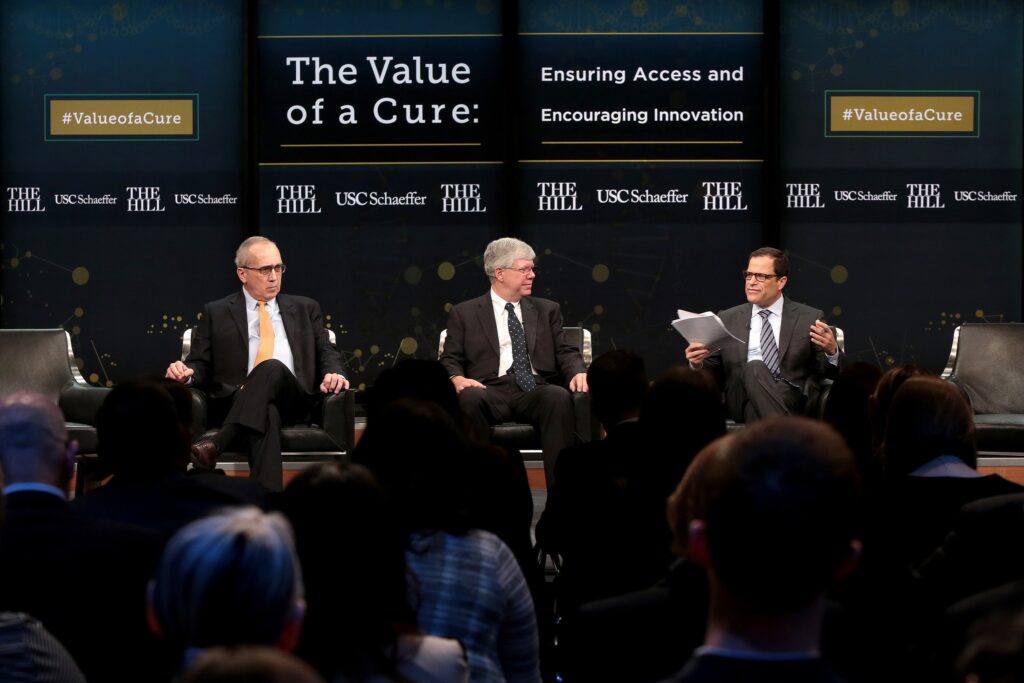Pharmaceutical innovation faces multiple challenges from payment systems that don’t reward long term payoff, according to experts assembled on Tuesday to discuss how to value new cures.
The discussion before an audience of over 150 at the Newseum in Washington D.C. was presented by The Hill and the USC Leonard D. Schaeffer Center for Health Policy & Economics. It explored the tension between ensuring patients can have access to cures while also establishing the economic incentive that will encourage new drugs.
Dana Goldman, director of the Schaeffer Center, noted that “once we have a cure we want broad access.” But current pricing models might actually exacerbate disparities, he said.
A panel moderated by Goldman focused on the example of Hepatitis C. Dr. Douglas Dieterich, director of the Institute for Liver Medicine at Mount Sinai Health Systems, called the treatment developed by Gilead Sciences Inc. “absolutely astounding.” Over 500,000 people in the U.S. have been cured in the last three years, and over 1 million worldwide.
Dieterich accidentally became infected with Hepatitis C in 1977 as a medical student. He defeated the virus after undergoing lengthy and debilitating interferon-based treatment that promised only a 20% cure rate. By contrast, the new treatment has a 98% cure rate with virtually no side effects.
But the price of the treatment coupled with an unexpected demand, which was initially listed at $84,000 before rebates, produced resistance from public and private payers, and fueled new controversy about drug pricing.
Jim Myers, executive vice president of Worldwide Commercial Operations at Gilead, said the company priced the treatment based on the current cost of care of Hepatitis C patients. In the long run the treatment will save hundreds of thousands per patient, but “the system is budgeted to handle chronic diseases, not cures,” he said during the second panel which focused on access issues.
Insurance companies on average keep a customer for only 2 ½ years, so they don’t get the benefit of paying for a cure that works out over time, said Dieterich.
“It is such a no brainer to cure this disease,” he said. “The incentives are going the wrong way.”
Cures come only after years of costly research, said Dr. Timothy Wright, chief R&D officer at Regulus Therapeutics. It is easier for drug companies to try to squeeze out efficiencies in their operations than to risk big money attacking disease, especially if the market is small, he said.
“Innovation is fragile,” he said.
Myers said Gilead “invested hundreds of millions without success” before hitting on its Hepatitis cure. But the message back from the market was “why bother?” he said. Long term, “that would be horrible,” he added.
The Veterans Administration, which keeps many patients for a lifetime, was an exception. “They got this immediately,” he said.
Dr. Georges Benjamin, executive director of the American Public Health Assn., noted that to make progress in that area “we have to get everybody insured.”
Dr. Garth Graham, president of the Aetna Foundation, cautioned that focus on cures can overlook that more lives are saved through gains in public health and prevention. “Diet and exercise has more effect that any medicine.” he said.
Carmon Pastor, president of Fuerza Contra Alzheimer’s, urged more education for families of Alzheimer’s patients, who may not understand that current medicines are not effective in reversing the disease and may be a waste of money.
Two members of the House of Representatives, Diana DeGette (D-CO) and Fred Upton (R-MI), said their work on the Cures Act of 2016 should be a model for bipartisan cooperation on reforming health care.
The Act added money for the FDA to speed drug approvals and to NIH for research. However, a hiring freeze and a tight budget proposed by the Trump Administration are casting a shadow on the implementation of the Act.
If the Act can live up to its promise of getting new drugs to market faster, “we hope that will put downward pressure on prices,” Upton said.
“Drug pricing needs a robust debate,” said DeGette. “Hopefully we can get hearings on that this year.”
A video of the conference can be found here. An issue brief produced by the Schaeffer Center can be found here.
